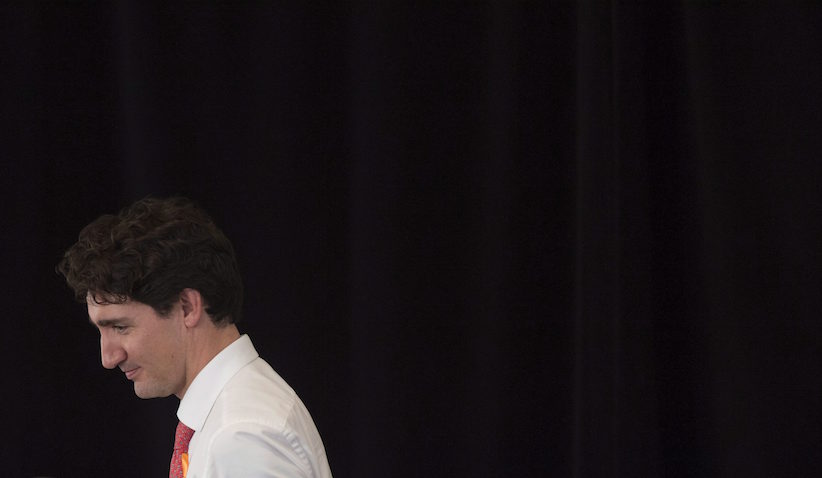Justin Trudeau is just not that into you
The MyDemocracy.ca farce and how Canada’s boyfriend suddenly lost interest in us
Share

This week, the federal government channelled Cosmopolitan with the launch of MyDemocracy.ca. Instead of a “What’s your sex style?” quiz, however, Canadians got to determine their “democracy style”—whether they’re “innovators,” “co-operators,” “pragmatists,” “challengers” or “guardians,” each described like a horoscope, but with less science.
The farcical project, billed as “an innovative way to join the national conversation on electoral reform,” is neither interactive nor focused on electoral reform: participants aren’t even asked which voting system they’d prefer. How the information will be marshalled is unknown. Backlash, in the House of Commons and on social media, was swift.
The reaction isn’t only to Liberal backtracking on a topic in equal parts glaze-inducing, fractious and vital. The episode also appears to mark a tipping point in Justin Trudeau’s avatar as the nation’s progressive, swoon-worthy boyfriend. Suddenly, he’s the guy who orders for his date without asking what she wants then ignores her ensuing protest.
It was Trudeau who raised the electoral reform “conversation,” unbidden, during the election campaign. He promised 2015 “will be the last federal election conducted under the first-past-the-post voting system.” He vowed to “make every vote count,” a vow that suggested support for proportional representation (PR), a system under which the percentage of seats a party receives more closely mirrors the popular vote. Certainly, there’s been much electoral reform busy-work: Minister of Democratic Institutions Maryam Monsef toured the country; an all-party committee heard from some 200 experts and delivered a 333-page report recommending PR, to be decided by a national referendum.
More from Anne Kingston: How 2016 became the year of the ‘nasty woman’
Yet with a Liberal majority (based on 39.6 per cent of the vote), gears shifted; electoral reform is now portrayed as complex and overwhelming—even “radical,” to use a favoured talking point. The putative quest for fairer representation has summoned the more autocratic qualities of a “sunny ways” government—one that favours a stacked ballot system, does not want a referendum and now talks of reaching “consensus” with the clock ticking. In October, the PM told Le Devoir that “the motivation to want to change the electoral system is less urgent,” given how delighted Canadians are with his government. Last week, Monsef mocked and misrepresented her own committee’s work in the House while flouting its no-props rule: she held up a paper containing the Gallagher Index, a calculation used to gauge a voting system’s proportionality, calling it “an incomprehensible formula” as if it were the national homework assignment from hell.
Electoral reform isn’t the Liberals’ first reversal or backpedal on election promises—that list includes pledges made to First Nations, to lead on climate change, to clean up cash-for-access fundraising. But it was the most symbolically freighted gesture of a candidate who operates superbly on the level of symbolism. Yes, there was opportunism in Trudeau bogarting a long-time NDP platform, but the electoral reform promise also cemented him as a “real change” politician willing to shatter a first-past-the-post model that benefits big parties like the Liberals. It was more than symbolism, of course: electoral reform, PR particularly, has been proven to result in more diversity and greater female representation.
Now the nation’s boyfriend appears to be manifesting the same stonewalling, talking-point-reliance and dismissal-of-evidence tendencies that saw the last guy dumped. In a meeting with the Toronto Star, Trudeau called the electoral reform quiz “a fun little questionnaire that gets into values rather than models, to help us see if there are underlying principles and things that Canadians all agree on broadly that can drive a solution for electoral reform.” Yet Canadians have already agreed broadly: close to 63 per cent voted Liberal, NDP, Green or Bloc; all support electoral reform. In the past, the sight of the PM shirtless or doing push-ups for a good cause would have saved the day and summoned international envy. But Trudeau’s Instagrammable goodwill is running dry of late between his cringe-inducing encomium to Fidel Castro and pipeline approvals that shredded his eco cred. Inattention has become another concern; new stats indicate the PM is more absent than not for question period; he wasn’t present to witness Monsef’s blowout last week or for the ensuing furor this week.
But if a government can subject a nation to a loaded Cosmo-style quiz on electoral reform, it’s only reasonable that the country can turn for its political guidance to a 2004 dating bestseller, one that famously instructed women to heed a fellow’s actions, not his words. The advice is equally relevant dealing with a politician’s apparent cynical hypocrisy toward a bold election platform that made a nation fall for him (along with the vow to legalize pot). And unless there’s an unexpected policy reversal, it’s the only takeaway, as heartbreaking as it may be: Canada, Justin Trudeau is just not that into you.